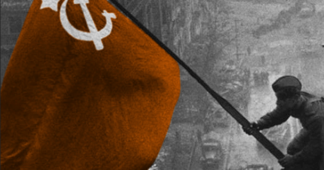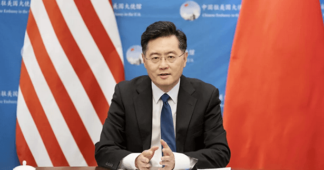US doesn’t realize it’s repeating the wrong path of Soviet Union: expert
By Yang Sheng Chen Qingqing
Dec 26, 2021
The former socialist superpower the Soviet Union (USSR) collapsed on December 25, 1991, while China, a major power which chose the path of socialism with Chinese characteristics different from that of the USSR, has become the biggest economy on a purchasing power parity basis. It is also the most powerful and successful socialist country en route to realize modernization and industrialization without choosing the Western capitalist model, as well as “the most important strategic competitor” in the eyes of the US.
Chinese people hold mixed feelings over the collapse 30 years ago, as they hold sympathy toward Russian people who consequently suffered a series of tragedies, but they also find that the collapse of the red giant is a significantly valuable lesson for China to keep developing and improving socialism with Chinese characteristics.
Just as discussions are rife among observers and scholars worldwide, there has been much debate appraising the legacy of the collapse of the USSR from Chinese experts, commentators and ordinary people on Chinese media and social media platforms in recent days, but their voices are quite different from the Western ones.
Portraying the US as the “victor” of the Cold War, many media and scholars from the US and other Western countries are at pains to attribute the collapse of the USSR to its socialist path, claiming that its choice caused mistakes like military expansion, Great-Power chauvinism and failed economic reform.
But a mainstream view in China is that socialism is correct, and that it was effective in helping the Soviet Union defeat fascism and build a superpower. The error lay in that leaders of the USSR after Joseph Stalin deviated from the path of socialism, and even betrayed the path and the people of Soviet Union, said Chinese experts, stressing that the success of China today has further strengthened the correctness of this view.
A valuable lesson
Li Shenming, former vice president of the Chinese Academy of Social Sciences, told the Global Times that “there are many different explanations from around the world about why the Soviet Union collapsed, but the one which holds that ‘Stalinism,’ or ‘the socialist model of the Soviet Union,’ is the root cause continues to dominate.”
“But in China, we have reached common ground after much research and many discussions that Stalinism is not the root cause, and the real reason is that, from Nikita Khrushchev to Mikhail Gorbachev, the leadership of the Soviet Union gradually deviated from and eventually betrayed Marxism, socialism and the fundamental interests of the overwhelming majority of the people,” Li noted.
To blame Stalin, or the socialist model built by Lenin and Stalin, for the collapse of the Soviet Union is irresponsible, Li said. “Although the model was not perfect and needed reforming, the Soviet Union achieved great goals such as industrialization, victory in World War II and a successful post-war reconstruction under this model,” Li said.
The starting point of the Soviet Union’s collapse was the reform initiated by Khrushchev, because it failed to address the problems. Instead, it gradually denied the basic political and economic system of the Soviet Union’s socialism, and when it came to the Gorbachev era, the leadership of the country fully betrayed Marxism and chose a path with no turning back, experts said.
The Soviet Union’s leaders were not just betraying their original aspiration, but also forgot that serving the people is their core mission, rather than becoming enmeshed in power struggles with other countries, bullying and threatening its comrades within the socialist bloc including China, pursuing military expansion and even invading other countries like Afghanistan, said Chinese analysts.
“The Soviet Union could send satellites to space and expand its geopolitical influence sphere, but it could not fix its problems with the shortages of food, textile and daily necessities, which further fueled social conflicts,” Wang Xianju, deputy director and research fellow at the Renmin University of China – Russia St. Petersburg State University Russian Research Center, told the Global Times.
The Communist Party of China (CPC) has always stressed that all-out developments and achievements we gained and we are paying efforts to achieve are just for one fundamental purpose: serving the people, Wang noted.
The Soviet Union’s leaders also wanted to fix the problems, but they mistakenly believed that liberalization or Westernization could fix everything for their country. Figures like Gorbachev or former president Boris Yeltsin embraced the Western capitalist political system and ideology and eventually buried the great country that was built by their predecessors, Li said.
The disintegration of the Soviet Union is “a vaccine for China,” said Hu Xijin, a commentator for the Global Times, because it keeps telling China about what is wrong and which way is a dead-end, and what kind of reform will cause the death of a great country and a great party.
Russia’s unhappy memory with the US and other Western countries after the Soviet Union’s collapse is another vaccine for China, “because it tells us that Russia won’t be accepted by the West even when it has abandoned socialism and disintegrated its own country into pieces,” said a Beijing-based expert on international relations who asked for anonymity.
“The struggle with the West is not mainly about ideology or ‘human rights and freedom,’ it’s about power and geopolitics, and a ‘suicide’ like the Soviet Union did to itself won’t stop hostility from the West, but will only bring setbacks, chaos and civil wars and more military expansion from the West,” he noted.
The US to repeat USSR’s path?
China has learnt from the lesson and avoided repeating the mistakes made by the Soviet Union to realize the successful development. As it continues marching toward its goal of national rejuvenation, the US, the competitor of the Soviet Union which believes it has won the Cold War, is likely to repeat many mistakes made by its old rival, said analysts from both China and Russia.
On the eve of the anniversary of his resignation as the leader of the former Soviet Union, Gorbachev told state news agency RIA Novosti on Friday that Washington grew “arrogant and self-confident” after the collapse of the Soviet Union, leading to the expansion of the NATO military alliance. However, he welcomed the upcoming security talks between Moscow and Washington.
Answering whether it was possible, after the collapse of the USSR, to build relations with the US in a different vein without hurting the sovereignty of Russia, the former Soviet leader noted the “triumphant mood in the West, especially in the US” after the Soviet Union ceased to exist in 1991.
“They grew arrogant and self-confident. They declared victory in the Cold War,” Gorbachev said. He insisted that it was ‘together’ that Moscow and Washington pulled the world out of confrontation and the nuclear race. “No, the ‘winners’ decided to build a new empire. Hence the idea of NATO expansion,” Gorbachev said, adding that “How can one count on equal relations with the United States and the West in such a position?”
Russian President Vladimir Putin said in June that he was convinced that the US is following a typical scenario of an empire: confident of their unlimited power, empires create unnecessary problems for themselves until they can no longer cope with them, TASS reported.
“Do you know what the problem [of the US] is? I’ll tell you, as a former citizen of the Soviet Union. The problem of empires is that they think they are so powerful that they can afford small inaccuracies and mistakes,” he told the media.
In his words, empire rulers are confident they can intimidate, persuade or buy the loyalty of nations or groups, and they believe all their problems can be solved this way.
“But problems keep piling up. And, at some point, they are no longer able to cope with them. And the United States is now walking the Soviet Union’s path, and its gait is confident and steady,” the Russian leader added.
We have found some interesting similarities between the US today and the former Soviet Union in 1970s-80s, the period before the disintegration, said the anonymous Beijing-based expert, and he listed some similarties such as “abuse of power in military expansion, gerontocracy, overconfidence on its ideology, failure to correct mistakes and push no effective reform, but being eager to blame other countries for its own mess, and pursuing great power competition driven by a Cold War mentality.” He said that if the US fails to discover this problem, it is very likely to repeat the tragic destiny of the Soviet Union.
Published at www.globaltimes.cn











